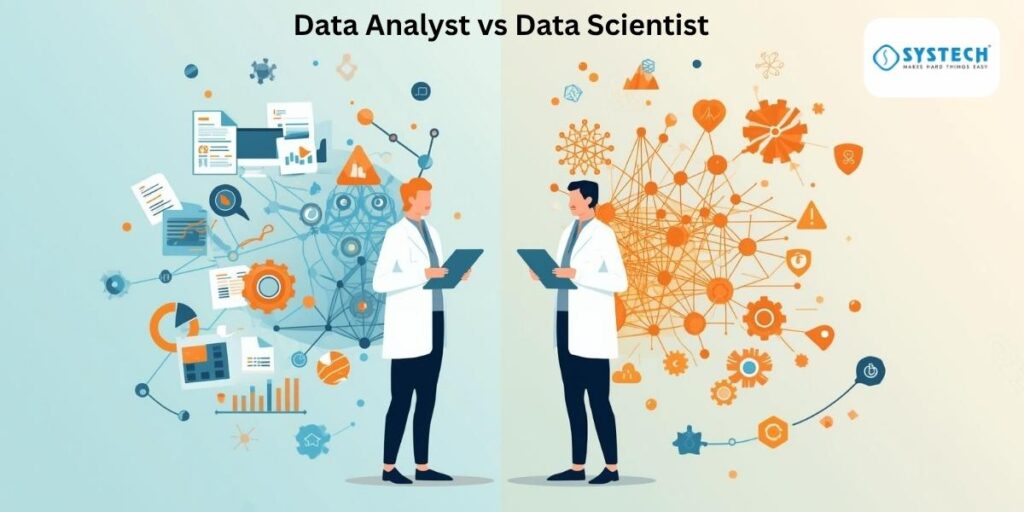Table of Contents
Introduction:
In today’s digital age, data drives every business decision. From start-ups to tech giants, companies bank on smart insights to stay competitive. For students and professionals exploring data-driven careers, a common question arises: What is the difference between a Data Analyst and a Data Scientist, and which career should I choose? Choosing the right path can be confusing because both sound similar yet demand distinct skills and responsibilities. Making the wrong choice can mean wasted time, effort, and career stagnation. This guide demystifies the difference between Data Analyst and Data Scientist by breaking down their roles, skills, growth opportunities, and salaries so you can confidently map your career path.
What You’ll Learn
- Clear understanding of the difference between a Data Analyst and a Data Scientist.
- Insights into data analyst vs data scientist roles in the industry.
- A detailed look at the required skills and educational background.
- Comparative overview of data analyst vs data scientist salary trends.
- Career growth prospects for both roles.
- Practical tips to decide which career suits your goals.
Understanding the Data Analyst Role
A Data Analyst is primarily responsible for interpreting data, generating reports, and helping organisations make informed decisions. Their role focuses heavily on descriptive analytics — understanding what happened and why.
Key Responsibilities of a Data Analyst
- Cleaning and processing raw data from multiple sources.
- Creating dashboards and reports for business teams.
- Performing statistical analysis to identify trends.
- Communicating findings to stakeholders in simple terms.
Imagine a retail company struggling with declining sales. A Data Analyst will dig into transaction records, identify which products sell less, and highlight seasonal patterns. Their insights help management take corrective action, such as adjusting pricing or marketing strategies.
Explore Insights with Data Analytics
Understanding the Data Scientist Role
A Data Scientist, on the other hand, works on predictive modelling, machine learning, and advanced analytics. They focus on answering more complex questions like What will happen next? or How can we improve efficiency using AI?
Key Responsibilities of a Data Scientist
- Building machine learning models on structured and unstructured data.
- Performing predictive and prescriptive analytics.
- Designing algorithms and recommending long-term strategies.
- Leveraging advanced tools like Python, R, TensorFlow, and Spark.
Real-world Example
For the same retail company, a Data Scientist may build a machine learning model to forecast next season’s sales or recommend personalised product suggestions to customers based on their past purchases.
Data Analyst vs Data Scientist Roles
While both careers utilise data, their day-to-day functions differ significantly.
- Data Analysts: Work with historical data to discover patterns and create reports.
- Data Scientists: Use advanced technical skills to predict future outcomes and build solutions powered by AI.
- Analysts usually collaborate with business teams, whereas Scientists often work with developers, statisticians, and AI engineers.
Essential Skills of a Data Analyst vs a Data Scientist
To understand the skills of a Data Analyst vs a Data Scientist, let’s break them down.
Skills of a Data Analyst
- Strong knowledge of Excel, SQL, and data visualisation tools like Tableau or Power BI.
- Statistical expertise for analysing trends.
- Clear communication to explain insights.
Skills of a Data Scientist
- Expertise in Python or R programming.
- Experience with machine learning algorithms and deep learning.
- Ability to work with big data frameworks like Hadoop or Spark.
- Strong mathematical and statistical background.
Data Analyst vs Data Scientist Salary
One of the most debated aspects is the data analyst vs data scientist salary.
- Data Analysts in India: Entry-level salaries range from ₹4–6 LPA, with experienced professionals earning ₹10–12 LPA.
- Data Scientists in India: Freshers may start around ₹8–12 LPA, while experienced professionals easily cross ₹20–25 LPA.
Globally, Data Scientists generally earn more because of the technical complexity of their role.
Boost your career with expert guidance!
Career Growth Data Analyst vs Data Scientist
When comparing career growth, Data Analyst vs Data Scientist, the long-term opportunities differ.
Growth Path of a Data Analyst
- Junior Data Analyst → Senior Data Analyst → Business Analyst → Analytics Manager.
- Many Data Analysts also transition into Data Science over time.
Growth Path of a Data Scientist
- Data Scientist → Senior Data Scientist → Machine Learning Engineer → Chief Data Officer.
- Since Data Science requires advanced AI skills, career progression is rapid and often lucrative.
Which Career is Right for You?
Now that you understand the difference between a Data Analyst and a Data Scientist, the choice depends on your personal strengths, educational background, and interests.
- Choose Data Analyst if:
- You enjoy working with reports, visualisation, and simpler statistical analysis.
- You want an entry point into the analytics field.
- Choose Data Scientist if:
- You love coding, mathematics, and creating predictive models.
- You aim for high-paying, research-driven roles with international demand.
Training and Certification Opportunities
For those aiming to build a career in Data Analytics or Data Science, structured training can accelerate your learning curve and open doors to better opportunities. In India, several reputed institutes offer beginner-friendly as well as advanced programs designed for IT professionals and career changers.
Even students from networking or related domains can benefit from these programs, as data literacy is now a core skill across industries. Certification courses not only cover theoretical foundations but also emphasise practical application through case studies, real-world datasets, and capstone projects.
Systech Group (Chennai, Trichy, Coimbatore) offers specialised Data Science programs with a hands-on, project-based approach. The curriculum focuses on industry-relevant tools and techniques, helping students build practical skills. Graduates gain the confidence and expertise needed to excel in data-driven careers.
Launch Your Data Science Career!
Conclusion
The difference between a Data Analyst and a Data Scientist lies in scope, skills, responsibilities, and salary. Analysts uncover insights from existing data, while Scientists create intelligent systems that predict and recommend. Your choice should depend on what excites you more — simplifying data for business or building complex AI-driven solutions. Whatever you decide, the demand for both roles is growing rapidly in India and globally, giving you a secure future.
Ready to shape your career with data? Take the next step towards mastering analytics or data science today.
FAQs
What is the key difference between a Data Analyst and a Data Scientist?
A Data Analyst focuses on analysing past data, while a Data Scientist builds models to predict future outcomes.
Which role has a higher salary in India?
Typically, Data Scientists earn higher salaries than Data Analysts due to the complexity of their work.
What are the main skills of a Data Analyst vs a Data Scientist?
Data Analysts require SQL, Excel, and dashboards, while Data Scientists need advanced skills in Python, R, and machine learning.
Is career growth better for Data Analysts or Data Scientists?
Both have strong prospects, but Data Scientists often advance quickly into leadership roles like Machine Learning Engineer or CDO.
Can a Data Analyst become a Data Scientist?
Yes, with additional training in machine learning, coding, and advanced statistics, many Data Analysts transition into Data Scientist roles.

